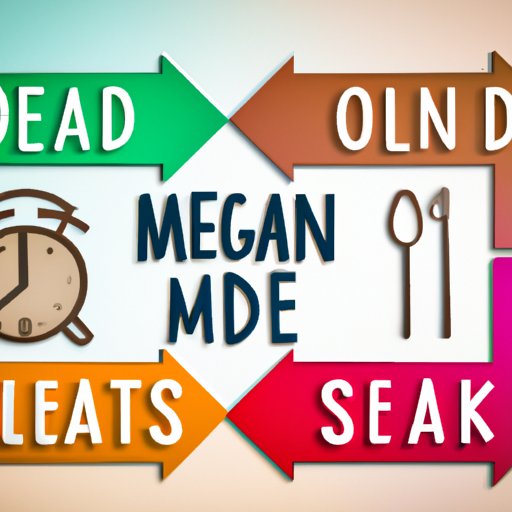
Introduction
Do you find yourself snacking on leftovers or indulging in midnight snacks before going to bed? Or perhaps you’re able to resist the urge to munch, but still find that you don’t sleep well at night? You’re not alone. Late-night eating affects sleep quality and can even hinder weight loss progress. Understanding the importance of meal cut-off time before bed can help you to achieve better health and more restful nights. In this article, we’ll explore the optimal time to stop eating before bedtime, backed by science-based evidence.
The 3-Hour Rule: Why You Should Stop Eating Before Bedtime
The 3-hour rule suggests that you should stop eating at least three hours before bedtime. This recommendation is based on the digestion process, which usually takes two to three hours. Consuming food immediately before bedtime interrupts the natural digestive process, preventing your body from completing digestion before you fall asleep. This can lead to discomfort, bloating, and heartburn, making it difficult to fall asleep and stay asleep.
Additionally, studies have shown that nighttime eating can increase the risk of acid reflux, a condition where stomach acid finds its way back up to your esophagus, causing burning pain in your chest and throat. Nighttime reflux disturbs sleep and can cause long-term damage to the esophagus.
For an ideal pre-sleep meal timing, it’s recommended to consume your last meal of the day at least three hours before your desired bedtime. For instance, if you plan to sleep at 11 pm, you should avoid eating anything after 8 pm.
Is Late-Night Snacking Ruining Your Sleep? Here’s What Science Says
Do you experience difficulty sleeping or have restless sleep even when you don’t eat anything close to bedtime? Late-night snacking could be the culprit. Consuming calorie-dense foods at night can lead to poor sleep quality, which can affect overall physical and mental well-being.
Studies show that late-night snacking increases sleep pattern disruption and reduces restorative slow-wave sleep, resulting in fatigue and poor performance during the day. Moreover, eating high-fat meals before bedtime can cause nightmares and vivid dreams in some people.
If late-night cravings are standing between you and restful sleep, try substituting your standard snack with melatonin-rich foods like cherries, oatmeal, or a banana. These foods can help regulate your natural circadian rhythm, making it easier for you to fall asleep and stay asleep.
The Importance of a Pre-Sleep Meal Cut-Off Time for Weight Loss
One of the most significant factors affecting weight loss progress is after-dinner snacking or eating late at night. Late-night eating can increase the number of calories you consume, leading to weight gain and other health issues.
Several studies indicate that a pre-sleep meal cut-off time can aid in weight loss. Participants in one study who followed a set meal timing schedule for six months showed significant weight loss compared to the group who ate freely at any time of the day or night.
The body’s metabolism slows down at night, making it harder to burn calories consumed closer to bedtime. Consuming calories shortly before going to bed leads to the body storing those calories as fat, negatively impacting weight loss progress.
If you’re serious about losing weight, try instituting an earlier pre-sleep cut-off time for food consumption. Falling asleep on an empty stomach may feel strange at first, but you’re likely to find that the results are worth it.
Maximizing Your Zzz’s: Why You Shouldn’t Eat At Least 2 Hours Before Sleeping
The minimum recommendation for cutting off food consumption before bed is two hours. Ideally, avoid consuming any calories within two hours of your bedtime to optimize your sleep quality. Digesting food is a biological process that sends a signal to the brain, advising it to stay alert and wakeful. This natural response may interfere with falling asleep quickly and staying asleep longer.
Furthermore, late-night eating can affect circadian rhythm, the body’s natural sleep and wake cycle. The body’s internal clock depends on various cues, including light exposure, physical activity, and food intake. Ingesting foods at night can disturb the body’s natural circadian rhythm, causing disrupted sleep patterns.
Incorporating healthy sleeping habits such as a pre-sleep meal cut-off time can lead to longer, better-quality sleep with fewer interruptions, leading to improved physical and mental health outcomes.
Late-Night Munchies: Why You Should Say Goodbye to Midnight Snacks
Summarizing the adverse effects of late-night snacking, it’s safe to say that kicking the habit can improve your health and quality of life. A pre-sleep meal cut-off time improves overall digestive, metabolic, and mental well-being and prevents late-night cravings, which can decipher your weight loss goals.
If you still have a hard time resisting the urge to munch before bedtime , there are practical and healthy techniques to help you out. Some of these include:
- Snack on fiber-rich fruits or veggies like celery, strawberries, and apples
- Stay busy with a relaxing activity like reading a book or coloring
- Drink water or herbal tea to curb your cravings
Conclusion
Understanding the importance of pre-sleep meal cut-off times can lead to improved physical and mental health outcomes. It can also improve sleep quality and aid in weight loss progress. Incorporating this healthy habit does not have to be an overhaul of your dietary habits all at once. Shifting meal times gradually can help you achieve better health goals. By saying goodbye to midnight snacks and implementing healthy lifestyle habits, you can enjoy better sleep and overall physical and mental well-being.
So pick a time for your pre-sleep meal cut-off and stick to it for a few weeks.




